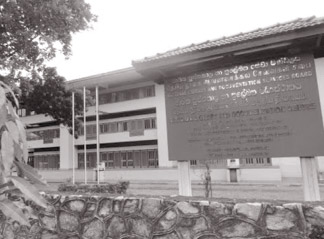Safeguarding Sri Lanka's intangible cultural heritage
G D Amarasiri
Cultural heritage is not only the monuments and collection of
objects. It also includes the traditions inherited from our ancestors.
The traditions include oral tradition, performing art, rituals,
festivals, knowledge, skills needed to produce traditional crafts etc.
These traditions may not be tangible. They cannot be touched. This is an
important part of our cultural heritage. This cultural heritage that
cannot be touched is known as intangible cultural heritage.
Communities create, carry and transmit intangible cultural heritage.
Each country has its own intangible cultural heritage and it shows the
cultural identity of a country. Understanding the intangible cultural
heritage helps to strengthen social solidarity of the people. Respecting
the intangible cultural heritages of other cultures helps to improve the
inter-cultural relations. Therefore, the intangible cultural heritage
has a tremendous social importance.
Intangible cultural heritage
Intangible cultural heritage is continuously recreated and
transmitted from one generation to another. There is a risk that certain
elements of intangible cultural heritage could disappear from the
community. Therefore, safeguarding intangible cultural heritage has
become an urgent requirement. The communities which practice intangible
cultural heritage are the people who could safeguard it. However outside
parties can help with safeguarding.
 |
|
The National Library and Documentation
Services Board (NLDSB) |
The United Nations Educational, Scientific and Cultural Organization
(UNESCO) is the United Nations specialized agency working to promote
international cooperation in the field of education, social and natural
sciences, culture and communication. UNESCO has been working for
safeguarding intangible cultural heritage for the last 60 years.
Information collection
As an important step UNESCO adopted a convention in 2003 for
safeguarding the intangible cultural heritage. UNESCO was able to
provide a legal administrative and financial framework to safeguard this
heritage. The main objectives of the convention are to project
intangible cultural heritage to ensure respect to it, to improve
awareness about its importance and develop international cooperation in
this field.
According to the convention, member states should implement several
measures in national and international level. In national level member
states should identify and define such heritage in their respective
countries. Member states should also draw up and update inventories of
intangible cultural heritage.
Sri Lanka is a rich country in intangible cultural heritage. In Sri
Lanka, folklore, folksong, folk poems, folk music, beliefs, rituals,
traditional festivals, practices, folk drama, performing art,
traditional crafts etc can be considered as intangible cultural
heritage. There are many traditional practices related to agricultural
and traditional medicine. Sri Lanka has also faced the danger of
dissappearing certain elements of intangible cultural heritage.
The National Library and Documentation Services Board (NLDSB)
implements a project for the conservation of intangible cultural
heritage in Sri Lanka. NLDSB implements this project with the assistance
of UNESCO. Under this project NLDSB has carried out a number of
activities. A national committee on intangible cultural heritage has
been appointed. This committee consists of experts in intangible
cultural heritage and representatives of institutions which deal with
activities related to intangible cultural heritage.
In additions, NLDSB has created a website on intangible cultural
heritage in Sri Lanka. This website includes information on intangible
cultural heritage in Sri Lanka. This website can be accessed through
www.natlib.lk.
NLDSB conducts research studies/surveys on intangible cultural
heritage in Sri Lanka. NLDSB has set up an information collection on
intangible cultural heritage in the National Library. This information
collection was opened by Education Minister Bandula Gunawardena on
January 27, 2012. This information includes books, manuscripts, audio
visual material etc on intangible cultural heritage in Sri Lanka. In
addition, the National Library of Sri Lanka has taken steps to make
aware the Sri Lankan community about this project.
The writer is a Director, National Library and Documentation Services
Board
|



